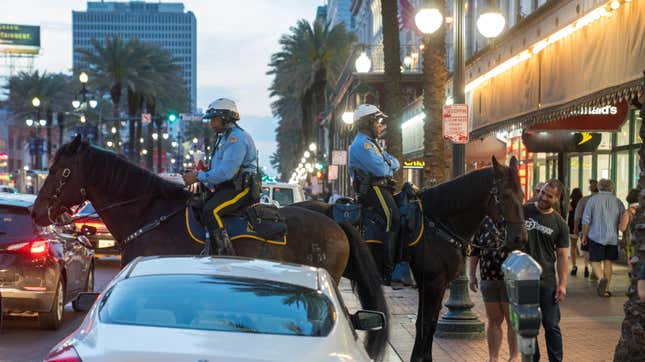
Police in New Orleans have been using facial recognition for the better part of a year, but the tech hasn’t had much of an impact on the city’s violent crime crisis. NOLA’s recently published quarterly public safety review, compiled by city consultant Datalytics, shows that during a nine-month period—between October 1, 2022, and July 1, 2023—there were “no arrests of an individual matched by facial recognition.” In other words: face recording has helped cops catch zero crooks. The data to back up that unfortunate assessment comes from the NOPD itself.
Facial recognition, which uses sophisticated cameras to scan people’s faces and compare their attributes to those of known criminal offenders, has been hailed by law enforcement as an essential tool for catching violent criminals. But questions remain about the technology’s accuracy and effectiveness, and privacy advocates have broadly decried the tool for its dystopian impact on society.
In 2020, amidst the George Floyd protests and widespread anti-police sentiment, New Orleans was one of several cities where local government voted to ban the use of facial recognition by the cops. The decision was hailed as a great victory by civil liberties advocates. Less than two years later, though, the ban was overturned when the city council voted to allow limited use of the technology when police were investigating “crimes of violence” or were attempting to ID a missing person. At the time, local politicians reasoned that re-instituting face-recording capabilities was really “a win for everybody” and “a tremendous stride towards greater public safety.” Unfortunately, this week’s report would seem to show that those politicians were just saying that to win political points.
The report’s sample size is small, indicating cops rarely even needed to use facial recognition technology. In addition to the revelation about the scanning tech’s zero-arrest record, the NOLA safety review shows that police only used it a total of 13 times during the period observed. Of those searches, only five led to matches and, of those matches, two were considered “bad,” meaning the technology identified a person who was actually “not suspected of having committed the crime.” All of the search requests were related to Black suspects, the report notes. Researchers have found facial recognition technology is less reliable in its attempts to identify people with darker skin.
NOLA’s face recording tech isn’t used very often, has been used exclusively on Black people, and frequently makes mistakes. Add to that the fact that the technology has never led to a successful conviction or arrest in the city, and you have yourself a situation that hardly seems defensible. On top of everything else, a previous report from Protocol showed that, prior to the 2020 ban, NOPD never kept official records of its facial recognition use. As a result, it’s unclear whether the city’s face recording tech has ever led to an arrest or not.